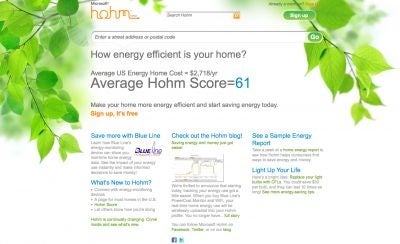Google vs. Microsoft in online smart meter monitoring

Microsoft announces the addition of a remote, real-time energy monitoring device to its Hohm service, while Google continues to expand its coverage as both vie for dominance of the smart meter market.
As the development of the smart grid continues, software manufacturers such as Google and Microsoft are throwing their weight behind developing online energy monitoring software.
Smart grids are simply electricity grids which use two-way digital technology and different power lines in order to reduce electricity consumption and wastage. Within the smart grid system are smart meters, these inform the user of the best time to use a high-energy appliance or monitor household electricity consumption, thereby allowing the user to avoid using appliances during periods of peak demand and minimize energy wastage in their home. Energy-efficient smart grids would therefore require less power and release less CO2 emissions into the atmosphere.
The two biggest names in the smart meter market are software giants, Google with Google PowerMeter and Microsoft with Hohm. On July 28 Microsoft announced that its smart meter service Hohm, will now be able to monitor customers' energy usage in real time using a wireless sensor linked to the customers' meter.
The real-time meter, developed by Blue Line Innovations, will also allow consumers to make adjustments to their energy usage by remotely turning off lights for example.
Hohm is currently only available to American consumers. Customers log into the Hohm site, enter their Windows Live ID and their postcode, then through a series of 180 questions regarding their home, Hohm predicts their energy usage, allowing users to monitor their energy and track consumption online.
Google PowerMeter includes a wider coverage of utility companies and geographical areas to its product, including First Utility and AlertMe in the United Kingdom, Yello Strom in Germany, Current Cost in the USA, Canada, United Kingdom, Australia and New Zealand, JEA in the USA and its most recent addition San Diego Gas and Electric in the USA.
Subscribers to these energy providers can log in through their online account and use the Google PowerMeter to monitor their energy usage.
The European Union predicts that 80 percent of households will have smart meters by 2020.
Join our commenting forum
Join thought-provoking conversations, follow other Independent readers and see their replies
Comments
Bookmark popover
Removed from bookmarks